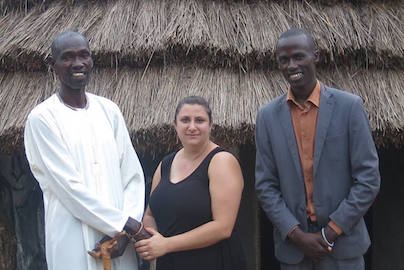Samantha Lakin '08 is helping to shed light on stories of victims

Samantha Lakin, center, in Uganda.
As a Fulbright Scholar in Switzerland after graduating from Brandeis, Samantha Lakin '08 worked with survivors of the Holocaust. She was drawn to their stories, and felt strongly that victims of other acts of genocide should have their voices heard.
For the last four years, Lakin has worked in Rwanda, most recently researching local perspectives of symbolic justice in the aftermath of the 1994 genocide as she works toward a PhD at Clark University.
Lakin spoke about her experiences in Rwanda at an event cosponsored by the Conflict Resolution and Coexistence master's degree programs at The Heller School and the International Center for Ethics, Justice and Public Life on Nov. 7.
Ahead of the event, she took some time to answer questions from BrandeisNow:
What is an example of how symbolic justice has taken place in Rwanda?
I interviewed a woman who survived a massacre that took place in Kigali, the Rwandan capital. She told me that right after the genocide, finding anyone else who was a survivor was rare. So when these individuals did find each other, they came together and went to take care of victims found in mass graves.
They went to look for their relatives, but they found graves with 50 or 100 people in them. They began to mark those places as a memorial site, and gave the remains they found proper burials. If we fast-forward, that same woman is now the mother figure of the student’s association of genocide survivors in Rwanda and today she speaks at commemorative events, to inspire others to rebuild their own lives like she did.
She serves as a good example of some of the types of symbolic justice we have seen both immediately after the genocide and in more recent times.
What purpose do these act of symbolic justice serve?
The commemorations create a moment of remembrance and for people to feel what they want to feel. People are sitting side by side and having very different experiences of what they are remembering. They also had different experiences during the genocide, not everyone is a survivor, but the commemorations carve out a moment in busy life to support those who are survivors. Part of it is also to support those who are still struggling --some have HIV, some are elderly and have no one to take care of them, they are still affected by their traumatic past, and the memorials and commemorations can provide a space for acknowledging that.
When thinking about justice, there’s no right way to do things, especially in cases of extraordinary crimes. We often think of legal forms of justice. What I’m trying to show is there is a broader impact within the social relationships between people, healing, and seeking justice. There isn’t one definitive form of justice that fits all people. For some of these surviving victims, the process of finding the remains of their loved ones and giving them a proper burial is a more profound form of justice than something imposed by a court against perpetrators.
Do you see opportunities for relationships between different groups to be improved? How?
There’s always an attempt to aggregate feelings and I think there is a lot of individuality to it. Some people are still angry and want revenge. Some people have forgiven. I think feelings run the spectrum today in Rwanda. I think there are opportunities for improvement. Economic opportunities can bring people together by offering a mutual benefit.
Truth seeking is also important. Seeing where victims are buried can be helpful and that knowledge usually comes from the perpetrator. Sometimes that information is discovered through the court system, but there is also a high level of people coming forward who want to tell what happened and seek forgiveness. There is a desire to not live with the guilt, especially in the eyes of their children.
Categories: Alumni, Humanities and Social Sciences, Student Life





